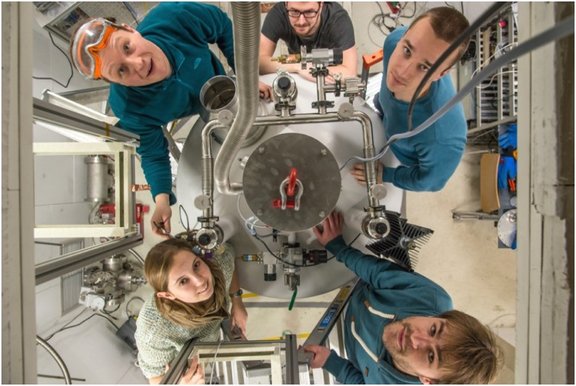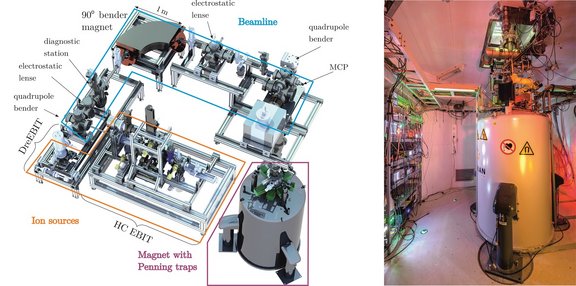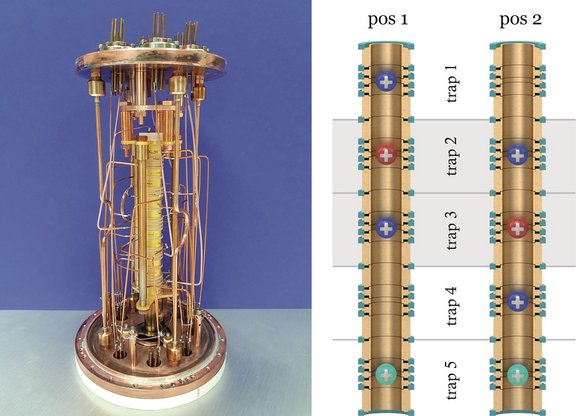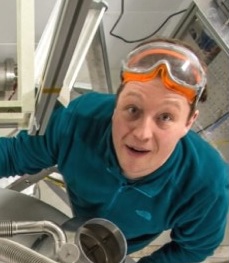PENTATRAP
Das Penningfallen Massenspektrometer PENTATRAP misst Massenverhältnisse von schweren, langlebigen, hochgeladenen Ionen mit einer Genauigkeit von δm/m <= 10-11 oder besser. Das Einzigartige an PENTATRAP sind die fünf Fallen [1,2], die gleichzeitig verwendet werden, eine selbstgebaute, ultrastabile Spannungsquelle [3] und externe Ionenquellen [4,5].
Das Experiment erstreckt sich über zwei Stockwerke. Die Ionenquelle und die Beamline befinden sich im Erdgeschoss der Experimentierhalle des MPIKs. Damit stabile Bedingungen für den Betrieb des Experiments gegeben sind, ist der Magnet ein Stockwerk tiefer in einem temperatur- und durckstabilisiertem Labor untergebracht.
Referenzen
| [1] | PENTATRAP: a novel cryogenic multi-Penning-trap experiment for high-precision mass measurements on highly charged ions, J. Repp et al., Appl. Phys. B 107, 983-996 (2012) |
| [2] | The trap design of PENTATRAP, C. Roux et al., Appl. Phys. B 107, 997-1005 (2012) |
| [3] | An ultra-stable voltage source for precision Penning-trap experiments, Ch. Böhm et al., Nucl. Instrum. Methods A 828, 125-131 (2016) |
| [4] | DREEBIT GmbH, Dresden. Instruction manual - Dresden EBIT with Wien Filter 2010 |
| [5] | The Heidelberg compact electron beam ion traps, P. Micke et al., Rev. Sci. Instrum. 89, 063109 (2018) |
EMMI
The research within the framework of the PENTATRAP project has close affiliation with the goals of the Extreme Matter Institute (EMMI) at GSI/Darmstadt. The institute was created by the Helmholtz Alliance "Extremes of Density and Temperature: Cosmic Matter in the Laboratory". This Alliance connects GSI with 7 national partners (among them the Max Planck Institute for Nuclear Physics at Heidelberg) as well as 4 international partners. With EMMI Europe will get a unique infrastructure for interdisciplinary investigations of matter under extreme conditions.
ERC Advanced Grant
This project receives funding from the European Research Council (ERC) under the European Union's Horizon 2020 research and innovation programme under grant agreement No 832848 - FunI.
Die hochgeladene Ionen werden in einer von zwei Elektronenstrahlionenfallen (EBIT) erzeugt, welche an der PENTATRAP Beamline sitzen. Die gewünschte Ionen werden hierbei durch Stoßionisation ionisiert. Die ionen werden mit einer Energie von mehreren keV pro Ladungszustand aus der EBIT extrahiert und in der Beamline ausgewählt und abgebremst.
PENTATRAP besitzt zwei EBITs, eine DreEBIT [4] und eine Heidelberg compact EBIT [5]. Um ebenfalls Ionen aus kleinen Proben zu bekommen (ungefär 10ng), wurde ein Laserbalationssystem in letzterer installierst [6].
Referenzen
| [4] | DREEBIT GmbH, Dresden. Instruction manual - Dresden EBIT with Wien Filter 2010 |
| [5] | The Heidelberg compact electron beam ion traps, P. Micke et al., Rev. Sci. Instrum. 89, 063109 (2018) |
| [6] | Production of highly charged ions of rare species by laser-induced desorption inside an electron beam ion trap, Ch. Schweiger et al., Rev. Sci. Instrum. 90, 123201 (2019) |

Der Penningfallentrum besteht aus fünf Fallen. Im Moment werden vier (Falle 1 bis 4) davon für Messungen benutzt, während die fünfte in der Zukunft als Monitorfalle für Magnet- oder Spannungsschwankungen geplant ist.
Das aktuelle Messschema , siehe oben, erlaubt es, etwaige Magnetfelddrifts während den Messungen in Falle 2 und 3 zu eliminieren. Das Frequenzverhältnis (bei gleichem Ladungszustand) in Position 1 (linkes Schema auf der rechten Seite) ergibt:

Danach werden die Ionen adiabatisch eine Falle nach unten transportiert und befinden sich dann in Position 2:

Verbindet man beide Messungen erhält man ein Frequenzverhältnis, welches unabhängig vom Magnetfeld ist, da sich die Magnetfelder rauskürzen (solange die Verhältnisse von B2 und B3 gleich bleiben):
Die Frequenzen der Ionen werden mithilfe der Spiegelstromtechnik gemessen. Die axial Frequenz kann hierbei direkt als Dip im Rauschspektrum des Resonators bestimmt werden. Die Magnetron- und reduzierte Zyklotronfrequenz werden durch eine Kopplung an die axiale Frequenz, entweder durch einen Doppeldip (Magentron) oder der PnP Technik (Zyklotron) bestimmt.
E=mc2: Ein Test von Einsteins specieller Relativitätstheorie ist möglich indem man einen Neutroneneinfangprozess in 35Cl untersucht. Die dabei freiwerdende Energie wird am ILL in Grenoble gemessen und verglichen mit der Massendifference von 35Cl und 36Cl:

Ein vorheriger Test hat E=mc2 bis zu einem Level von 1−Δmc2/E = (−1.4±4.4)·10−7 [7] bestätigt.
Dunkle Materie: Für Messungen der Linearität von King Plots ist die Masse der Isotope ein wichtiger Bestandteil auf der Suche nach Dunkler Materie. PENTATRAP wird hierfür die Massen von Isotopketten von Ca und Yb bestimmen.
Neutrinophysik: Durch die Entdeckung von Neutrinooszillationen ist bekannt, dass Neutrinos eine Masse haben. Die ECHo (Electron capture in 163Ho experiment) Collaboration [8] untersucht das Spektrum der emittierten Energie, die in 163Ho frei wird, nachdem 163Dy ein Elektron der inneren Schale in den Kern eingefangen hat:

Als unabhängiger Check kann der QEC–Wert des Übergangs als Massendifferenz von Ho und Dy bestimmt werden.
Bindungsenergie: Indem man die Massendifferenz von ionen in unterschiedlichen Ladungszuständen bestimmt, kann man die Bindungsenergie des zusätzlichen Ions messen und mit Werten der QED vergleichen [9]. Zum Beispiel in Xe:

Metastabile Zustände: Die Masse eines Ions mit einem Elektron, welches in einen höheren, langlebigen Zustand angeregt wurde, kann verglichen werden mit der Masse des Ions im Grundzustand. Eine solche, direkte Messung der Anregungsenergie in hochgeladenen Ionen kann verwendet werden, um theoretische Modelle zu verfeinern, welche schließlich mögliche Uhrenübergänge für neuartige Uhren vorhersagen können [10].
Referenzen
| [7] | A direct test of E=mc2, S. Rainville, J. K. Thompson, E. G. Myers, et al., Nature 438, 1096–1097 (2005) |
| [8] | The electron capture in 163Ho experiment – ECHo, L. Gastaldo et al., Eur. Phys. J. Spec. Top. 226, 1623–1694 (2017) |
| [9] | Mass-Difference Measurements on Heavy Nuclides with an eV/c2 Accuracy in the PENTATRAP Spectrometer, A. Rischka et al., Phys. Rev. Lett. 124, 113001 (2020) |
| [10] | Detection of metastable electronic states by Penning-trap mass spectrometry, R. X. Schüssler et al., Nature 581, 42–46 (2020) |

Aktuelle Mitglieder (Links zu wiss. Arbeiten, die an PENTATRAP durchgeführt wurden):
- Menno Door (Bachelor thesis , Master thesis)
- Dr. Sergey Eliseev (PI, Habilitation treatise )
- Dr. Pavel Filianin (PhD thesis )
- Dr. Wenjia Huang
- Kathrin Kromer (Master thesis )
- Daniel Lange (Bachelor thesis )
- Christoph Schweiger (Master thesis )
Gäste:
- Yuri Novikov
- Olesia Bezrodnova
Ehemalige Mitglieder:
Dr. Rima Schüssler (Master thesis , PhD thesis ), Jost Herkenhoff (Bachelor thesis ), Charlotte König (Master thesis ), Dr. Alexander Rischka (Bachelor thesis , Master thesis , PhD thesis ), Marius Müller (Bachelor thesis ), Janina Engelhardt, Dr. Andreas Dörr (PhD thesis ), Dr. Christine Böhm (PhD thesis ), Dr. Mikhail Goncharov (PhD thesis ), Dr. Julia Repp (PhD thesis ), Dr. Christian Roux (PhD thesis ), Dr. Sebastion George (PhD thesis )
19Nonlinear Calcium King Plot Constrains New Bosons and Nuclear Properties
A. Wilzewski, L. J. Spieß, M. Wehrheim, S. Chen, S. A. King, P. Micke, M. Filzinger, M. R. Steinel, N. Huntemann, E. Benkler, P. O. Schmidt, L. I. Huber, J. Flannery, R. Matt, M. Stadler, R. Oswald, F. Schmid, D. Kienzler, J. Home, D. P. L. Aude Craik, M. Door, S. Eliseev, P. Filianin, J. Herkenhoff, K. Kromer, K. Blaum, V. A. Yerokhin, I. A. Valuev, N. S. Oreshkina, C. Lyu, S. Banerjee, C. H. Keitel, Z. Harman, J. C. Berengut, A. Viatkina, J. Gilles, A. Surzhykov, M. K. Rosner, J. R. Crespo López-Urrutia, J. Richter, A. Mariotti, and E. Fuchs
Physical Review Letters 134, 233002 (2025)
Physics.aps.org: Searching for a New Force
Phys.org: Study tightens King plot-based constraints on hypothetical fifth force
QuantumFrontiers.de: Präzisionsexperimente für die Suche nach einer 5. Kraft
QuantumFrontiers.de: Precision experiments in the search for a 5th force
SFB 1227 DQ-mat: Präzisionsexperimente für die Suche nach einer 5. Kraft
SFB 1227 DQ-mat: Precision experiments in the search for a 5th force
Isoquant-heidelberg.de: Nonlinear Calcium King Plot Constrains New Bosons and Nuclear Properties
Popularmechanics.com: Physicists Found a New Clue That Could Reveal the Fifth Force
Futurezone.de: Grenzen der Physik gesprengt? Forscher finden Hinweis auf bislang unbekannte Kraft
MPIK-Pressemitteilung: Mit vereinten Kräften auf der Suche nach neuer Physik
MPIK press release: Joint effort in the search for new physics
Ethz.ch: Knifflige Suche nach einer neuen Kraft
Ethz.ch: Elaborate search for a new force
18Probing New Bosons and Nuclear Structure with Ytterbium Isotope Shifts
M. Door, C. Yeh, M. Heinz, F. Kirk, C. Lyu, T. Miyagi, J. C. Berengut, J. Bieroń, K. Blaum, L. S. Dreissen, S. Eliseev, P. Filianin, M. Filzinger, E. Fuchs, H. A. Fürst, G. Gaigalas, Z. Harman, J. Herkenhoff, N. Huntemann, C. H. Keitel, K. Kromer, D. Lange, A. Rischka, C. Schweiger, A. Schwenk, N. Shimizu, and T. E. Mehlstäubler
Physical Review Letters 134, 063002 (2025)
MPIK press release: Cross-disciplinary work on high-precision measurements pushes bounds on dark forces
MPIK-Pressemitteilung: Interdisziplinäre Arbeit an hochgenauen Messungen setzt neue Grenzen für dunkle Kräfte
Phys.org: Physicists find deformed nuclei when searching for 'dark forces'
Scienmag: Revolutionary Discoveries Unveil the Complex Architecture of Atomic Nuclei
idw press release: New insights into the structure of atomic nuclei
idw-Pressemitteilung: Neue Einblicke in die Struktur von Atomkernen
physicsworld: Atomic anomaly explained without recourse to hypothetical ‘dark force’
17Penning-trap measurement of the Q value of electron capture in 163Ho for the determination of the electron neutrino mass
C. Schweiger, M. Braß, V. Debierre, M. Door, H. Dorrer, C. E. Düllmann, C. Enss, P. Filianin, L. Gastaldo, Z. Harman, M. W. Haverkort, J. Herkenhoff, P. Indelicato, C. H. Keitel, K. Kromer, D. Lange, Y. N. Novikov, D. Renisch, A. Rischka, R. X. Schüssler, S. Eliseev, and K. Blaum
Nature Physics 20, 921-927 (2024)
MPIK press release: Ghost particle on the scales
MPIK-Pressemitteilung: Geisterteilchen auf der Waage
Phys.org: Ghost particle on the scales: Research offers more precise determination of neutrino mass
Science alert: Most Precise Measure Ever Brings Us Closer to Knowing The 'Ghost' Particle's True Mass
Nature Physics research briefing: Mass difference measurements help to determine the neutrino mass
16Atomic mass determination of uranium-238
K. Kromer, C. Lyu, J. Bieron, M. Door, L. Enzmann, P. Filianin, G. Gaigalas, Z. Harman, J. Herkenhoff, W. Huang, C. H. Keitel, S. Eliseev, and K. Blaum
Physical Review C 109, L021301 (2024)
15High-Precision Determination of g Factors and Masses of 20Ne9+ and 22Ne9+
F. Heiße, M. Door, T. Sailer, P. Filianin, J. Herkenhoff, C. M. König., K. Kromer, D. Lange, J. Morgner, A. Rischka, C.. Schweiger, B. Tu, Y. N. Novikov, S. Eliseev, S. Sturm, and K. Blaum
Physical Review Letters 131, 253002 (2023)
14Observation of a Low-Lying Metastable Electronic State in Highly Charged Lead by Penning-Trap Mass Spectrometry
K. Kromer, C. Lyu, M. Door, P. Filianin, Z. Harman, J. Herkenhoff, P. Indelicato, C. H. Keitel, D. Lange, Y. N. Novikov, C. Schweiger, S. Eliseev, and K. Blaum
Physical Review Letters 131, 223002 (2023)
MPIK press release: Towards the next-generation atomic clock
MPIK-Pressemitteilung: Auf dem Weg zur Atomuhr der nächsten Generation
13High-precision Penning-trap mass spectrometry for neutrino physics
S. Eliseev and Y. Novikov
European Physical Journal A 59, 34 (2023)
12High-precision mass measurement of doubly magic 208Pb
K. Kromer, C. Lyu, M. Door, P. Filianin, Z. Harman, J. Herkenhoff, W. Huang, C. H. Keitel, D. Lange, Y. N. Novikov, C. Schweiger, S. Eliseev, and K. Blaum
The European Physical Journal A: Hadrons and Nuclei 58, 202 (2022)
Erratum
11Fast silicon carbide MOSFET based high-voltage push–pull switch for charge state separation of highly charged ions with a Bradbury–Nielsen gate
C. Schweiger, M. Door, P. Filianin, J. Herkenhoff, K. Kromer, D. Lange, D. Marschall, A. Rischka, T. Wagner, S. Eliseev, and K. Blaum
Review of Scientific Instruments 93, 094702 (2022)
10A digital feedback system for advanced ion manipulation techniques in Penning traps
J. Herkenhoff, M. Door, P. Filianin, W. Huang, K. Kromer, D. Lange, R. X. Schüssler, C. Schweiger, S. Eliseev, and K. Blaum
Review of Scientific Instruments 92, 103201 (2021)
9Direct Q-Value Determination of the β− Decay of 187Re
P. E. Filianin, C. Lyu, M. Door, K. Blaum, W. J. Huang, M. Haverkort, P. Indelicato, C. H. Keitel, K. Kromer, D. Lange, Y. N. Novikov, A. Rischka, R. X. Schüssler, C. Schweiger, S. Sturm, S. Ulmer, Z. Harman, and S. Eliseev
Physical Review Letters 127, 072502 (2021)
MPIK press release: Important measuring method of neutrino physics on the test bench
MPIK-Pressemitteilung: Wichtige Messmethode der Neutrinophysik auf dem Prüfstand
idw press release: Important measuring method of neutrino physics on the test bench
8Perspectives on testing fundamental physics with highly charged ions in Penning traps
K. Blaum, S. Eliseev, and S. Sturm
Quantum Science and Technology 6, 014002 (2020)
7Detection of metastable electronic states by Penning trap mass spectrometry
R. X. Schüssler, H. Bekker, M. Braß, H. Cakir, J. R. Crespo López Urrutia, M. Door, P. E. Filianin, Z. Harman, M. W. Haverkort, W. J. Huang, P. Indelicato, C. H. Keitel, C. M. König., K. Kromer, M. Müller, Y. N. Novikov, A. Rischka, C. Schweiger, S. Sturm, S. Ulmer, S. Eliseev, and K. Blaum
Nature 581, 42-46 (2020)
Nature News & Views: Mass spectrometry for future atomic clocks
MPIK press release: Quantum jump tipping the balance
MPIK-Pressemitteilung: Quantensprung auf der Waage
MPG press release: Quantum jump tipping the balance
MPG-Pressemitteilung: Quantensprung auf der Waage
idw press release: Quantum jump tipping the balance
phys.org: Successfully measuring infinitesimal change in mass of individual atoms for the first time
Focus Online: Quantensprung auf der Waage
wissenschaft.de: Quantensprung auf der Waage
Physik in unserer Zeit: Quantensprung auf der Waage
Frankfurter Allgemeine Zeitung: Wie viel wiegt ein Quantensprung?
6Mass-Difference Measurements on Heavy Nuclides with an eV/c2 Accuracy in the PENTATRAP Spectrometer
A. Rischka, H. Cakir, M. Door, P. Filianin, Z. Harman, W. J. Huang, P. Indelicato, C. H. Keitel, C. M. König, K. Kromer, M. Müller, Y. N. Novikov, R. X. Schüssler, C. Schweiger, S. Eliseev, and K. Blaum
Physical Review Letters 124, 113001 (2020)
5High-resolution and low-background 163Ho spectrum: interpretation of the resonance tails
C. Velte, F. Ahrens, A. Barth, K. Blaum, M. Braß, M. Door, H. Dorrer, C.. E. Düllmann, S. Eliseev, C. Enss, P. E. Filianin, A. Fleischmann, L. Gastaldo, A. Goeggelmann, T. D. Goodacre, M. W. Haverkort, D. Hengstler, J. Jochum, K. Johnston, M. Keller, S. Kempf, T. Kieck, C. König, U. Köster, K. Kromer, F. Mantegazzini, B. Marsh, Y.. N. Novikov, F. Piquemal, C. Riccio, D. Richter, A. Rischka, S. Rothe, R. X. Schüssler, C. Schweiger, T. Stora, M. Wegner, K. Wendt, M. Zampaolo, and K. Zuber
European Physical Journal C 79, 1026 (2019)
4Production of highly charged ions of rare species by laser-induced desorption inside an electron beam ion trap
C. Schweiger, C. König, J. R. Crespo López-Urrutia, M. Door, H. Dorrer, C. E. Düllmann, S. Eliseev, P. Filianin, W. Huang, K. Kromer, P. Micke, M. Müller, D. Renisch, A. Rischka, R. Schüssler, and K. Blaum
Review of Scientific Instruments 90, 123201 (2019)
3An ultra-stable voltage source for precision Penning-trap experiments
C. Böhm, S. Sturm, A. Rischka, A. Dörr, S. Eliseev, M. Goncharov, M. Höcker, J. Ketter, F. Köhler, J. Repp, C. Roux, R. Schüssler, S. Streubel, R. Zirpel, J. Melcher, and K. Blaum
Nuclear Instruments and Methods in Physics Research Section A: Accelerators, Spectrometers, Detectors and Associated Equipment 828, 125-131 (2016)
2The trap design of PENTATRAP
C. Roux, C. Böhm, A. Dörr, S. Eliseev, S. George, M. Goncharov, Y. N. Novikov, J. Repp, S. Sturm, S. Ulmer, and K. Blaum
Applied Physics B: Lasers and Optics 107, 997-1005 (2012)
1PENTATRAP: a novel cryogenic multi-Penning-trap experiment for high-precision mass measurements on highly charged ions
J. Repp, C. Böhm, J. Crespo López-Urrutia, A. Dörr, S. Eliseev, S. George, M. Goncharov, Y. N. Novikov, C. Roux, S. Sturm, S. Ulmer, and K. Blaum
Applied Physics B: Lasers and Optics 107, 983-996 (2012)


